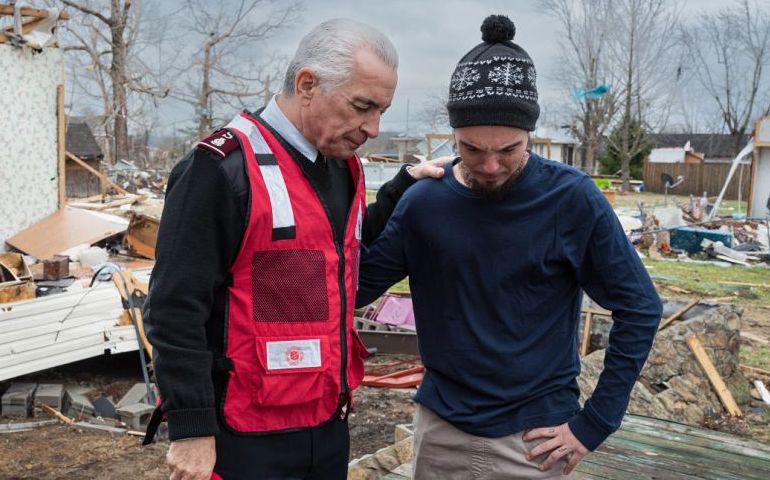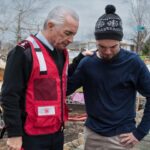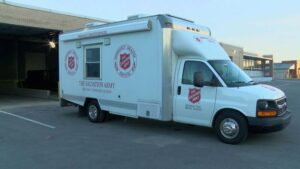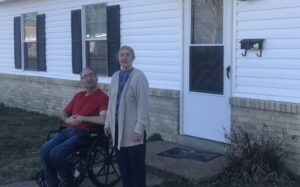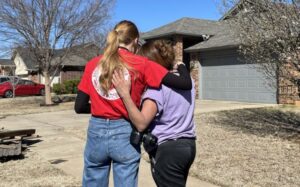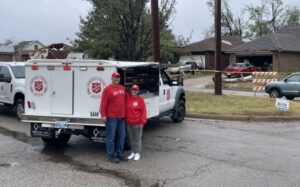Mayfield, KY (December 05, 2022) – This small town in Western Kentucky knows devastation. But the people here also know about redemption and resilience. “We are still Mayfield Strong,” says Mitzi Stanley, chairperson of the local Salvation Army Service Unit. “Our town has definitely come together as a community and continues to work towards rebuilding.”
It has been one year since a violent, long-tracked tornado tore across Western Kentucky, producing severe to catastrophic damage in many towns, including Mayfield, Princeton, and Dawson Springs. The tornado travelled an astounding 165 miles, at times becoming wrapped in rain and moving forward at 60 miles per hour across the Purchase Region and Western Coal Field. Fifty-seven fatalities were confirmed from the tornado, making it Kentucky’s deadliest tornado on record.
Almost immediately, The Salvation Army in the region sprung into action. Emergency Disaster Services responded from Madisonville to Dawson Springs approximately 20 minutes after the tornado moved through. Captain Lisa Good recalls the events of that night: “We immediately received a call from the sheriff’s office in Dawson Springs, requesting our assistance at the school. As we drove to the corps we sent a text to all of our employees who came within minutes and loaded up the canteen to head down there. Immediately upon arrival our team went into action. Ambulances had begun to arrive, and people were in shock all over the school. Our crew began to wrap people up in blankets and did their best to get names and turn them into the front table so that when others came looking, we had a list of people in the building. Myself and one other staff member went into the area where those injured were being assessed and cared for and immediately began to pray with those around and to comfort them. We were literally working in the dark while people were crying and screaming due to the pain because many were seriously injured that were brought to the school. The next several days consisted of serving meals and loving on survivors, trying to figure out who was still missing, trying to find people housing, and just dealing with life essentials in the moment. Not to mention it was right before Christmas. People lost their families, their house, their Christmas, and their joy. It was very emotional.”
Farther west in Paducah, Lieutenants David and Brittney Donegan had a similar recollection of the events of the night of December 10. They were immediately called to action after the storm had passed. “No class we took in officer training could have prepared us for that night. Our phone rang late that night, and it was one of our church members whose sister and husband were missing,” said Lieutenant David Donegan. “We immediately went during the storm to be there to comfort and pray with our church members as they received the devastating news about loved ones. As a pastor it is tough because you see the hurt in the eyes of the people you see day in and day out, the people you care most about. It is during times like that you know the love of Jesus Christ provides hope and, in that moment, you are the hands and feet of Christ. People left their homes in the middle of the night wearing their pajamas. The best way we could provide hope at that moment was to meet their immediate need- clothing, coats, shoes. We opened our Family Store and began giving clothes away and we have not stopped since,” said Lieutenant Donegan.
After the Paducah Corps finished their Angel Tree program that December, they converted their warehouse into a food service location and a service center that provided financial assistance to anyone who needed help. They served 540 people Christmas dinner and provided Christmas gifts to 847 children that otherwise would not have had Christmas.
Within days, The Salvation Army Southern Territory had deployed an Incident Management Team for their response. This consisted of mobile kitchen units, a command post, warehouse space with a logistics and warehouse manager, and a bevy of volunteers, staff, and officers to execute the Army’s disaster response plan. Over the course of the next 28 days, The Salvation Army served 19,372 meals, 11,232 drinks, 14,414 snacks, and conducted 2,535 emotional and spiritual care contacts with survivors. Approximately $200,000 worth of gift cards were also distributed to survivors. “The scope of the disaster was unimaginable. Towns were almost completely leveled. There was so much need in those first days, and I was proud of our team and the way we stepped up to meet that need in trying circumstances,” said Bo Sells, Incident Commander of the response.
Since that initial response of providing food and hydration, the Army has stayed in the area, providing long term care to meet any needs that other agencies, such as FEMA, are unable to meet. “I attend the Long-Term Recovery Group meetings in ten counties and help to build relationships with the community and address the unmet needs of those impacted by the tornado,” said Adam Day, Long Term Recovery Program Manager said. So far, The Salvation Army has provided nearly $100,000 worth of long-term recovery assistance to tornado survivors in Western Kentucky. If you are a survivor with an unmet need and would like to request assistance from The Salvation Army, please call (502) 612-2722.
Major Tom Louden, Divisional Commander for the Army in Kentucky & Tennessee, said of the effort, “I thank God for the incredibly generous support by our neighbors. It is our deep honor to serve the survivors of the Western Kentucky tornados and share God’s love for all through tangible means. We count it as one of the highest privileges to offer food, shelter, clothing, and critical life supplies in the name of Jesus; that is why we are The Salvation Army.”
To make a financial gift to support The Salvation Army’s disaster relief effort, go to helpsalvationarmy.org or call 1-800-SAL-ARMY (1-800-725-2769). One-hundred percent of designated disaster donations go to direct services for survivors and first responders.

